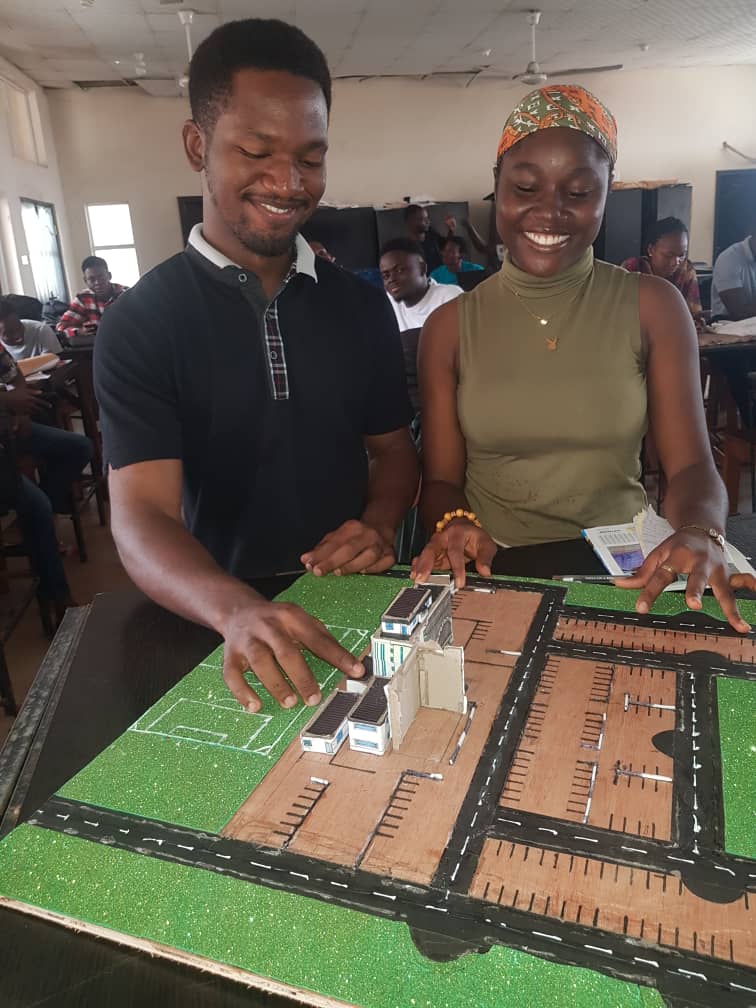
INTRODUCTION.
The impact of global recession has considerably shifted the landscape within which the architect must practice, exerting additional pressure on architects to demonstrate the value of good design. Equally, the financing of public sector projects through private/public collaborations continues to have a profound influence on the way buildings are procured and on who holds the control in the building process. All this has led to considerable flux in the profession and architects have to respond to the impact of a globalizing economy, exploding information technology capability and cultural confusion. There is therefore the need to balance the separation between what architects want to do, and the reality of the marketplace.
The technology of building is becoming increasingly complex, so much so that design works are being carried out by contractors and the likes. More and more detailed designs are left to subcontractors and specialist suppliers: cladding, roof structures, Mechanical and Electrical (M&E) installations, partitioning etc. Increased sophistication of detailing and building technology and its associated risk management have led to a gradual residualisation of the architect in favour of the contractor who will continue to take on an increasingly large part of the design work. This trend is exacerbated as architects look to reduce their liability by transferring it to the subcontractors and suppliers, and thereby losing influence. It is very clear that whichever party takes on the risk in the building process tends to drive the design. Increasingly, architects are integrating elements and components designed by others, acting in a design management role.
The concept of the architect as a technician who composes all the constituent parts of a building that are designed by the subcontractors can be a realistic vision of the future. However, the architects must acquire the appropriate and relevant management skills earlier in the education process, so that they might begin to take these roles on more often. In the contemporary context, the architect would be best placed to move into new fields of strategic consulting at higher levels, while trying to take back ground that has already been lost. While there is agreement that the architecture profession brought a ‘social science’ aspect to the building process that engineers often lacked, there is a need for architects to become more skilled in engineering if they must continue leading the production of buildings.

BRIEF HISTORY OF THE DEPARTMENT.
The Department of Architecture of the Faculty of Environmental Sciences is one of the newly established departments in the University of Benin. Consequent upon the need to improve the built environment in this region and the nation at large, the department was conceptualized to serve as a training ground for world class and competent Architectural Graduates that will effectively impact the built environment.
The department of Architecture under the Faculty of Environmental Sciences was conceived during the Prof. O.G. Oshodin led administration in 2013 through the injection of the Needs Assessments Impact and Tertiary Education Trust Fund (TETFund) intervention scheme. The staff recruitment exercise into the department took place in July, 2014 and was conducted during the Prof. O.G. Oshodin administration as Vice-chancellor under the chairmanship of Prof. Sunny Onohaebi. At the inception of the 2014/15 academic session, the department officially started with 8 academic staff members (recruited) while A.N Aniekwu was seconded to the department of Architecture from Civil Engineering department as the pioneer Ag. Head of Department (H.O.D.) and 4 non-academic staff members. The Nigerian Universities Commission (N.U.C.) Resource Verification exercise took place in September, 2015. Sequel to NUC approval for the commencement of academic programme in the 2015/16, 42 students were admitted while only 41 Pioneer Students duly registered to kick start the programme. The department presently has almost 200 students, 7 academic staff members, 2 technical staff members (Technologists) and 4 administrative staff members with Arc. L. E. Ebhomien presently the Lecturer in Charge of Architecture department.
Since inception, the department has received a lot of support from the University Authorities and other relevant professional bodies.
PHILOSOPHY.
The philosophy of the programme is to produce Architects capable of understanding and solving complex technical and environmental problems as well as applying the knowledge to tackle and co-ordinate other related professional inputs in the development of the environment;
OBJECTIVES.
- The infusion in the student of an understanding of the context of the design and construction in physical, cultural, social, economic and technological terms;
- Equipping the student with adequate knowledge, creativity, specialised skills and leadership capabilities that will enable the graduate to co-ordinate and control the design and construction processes and inputs thereto by allied professionals and executors.
- Training graduate Architect to be a consultant capable of undertaking:
i) Brief development, feasibility studies;
ii) Project initiation and development;
- Producing Professional Architect, capable of undertaking the whole range of Architectural design activities from schematic design through working and drawing to construction detailing and workshops drawing production.
- Providing the student with the knowledge and skills to undertake a wide range of management activities such as coordinating site meeting, site management, facilities management, post construction evaluation, etc.
- Providing the student with the knowledge and skill base from which he/she can proceed to further studies in architecture or related areas.
- Provide the student with entrepreneurial knowledge and skills to enable him/her to be self-reliant.
ADMISSION REQUIREMENTS:
Bachelor of Science (Architecture) – FOUR -Year full time degree programme.
A) UTME ADMISSION
Candidates seeking admission into the department of Architecture should possess the following qualifications:
At least five ordinary level credit passes at the West African Senior School Certificate examination (WASSCE) or NECO or GCE O/L or NABTEB or WASC, SSCE/GCE, NECO or any of their recognized equivalents at not more than two sittings in the following Subjects: Mathematics; English Language; Physics; and any two credit from Chemistry; Technical Drawing; Geography; Fine Art; Economics; Biology/ Agricultural Science; Building construction, Chemistry and land surveying.
Candidate must have at least a pass in Chemistry in any combination.
A) UTME SUBJECTS
i) English Language
ii) Mathematics
iii) Physics
And any of:
iv) Chemistry, Geography or Economics
B) DIRECT ENTRY
- This is admission requirement for the THREE year full time undergraduate Degree Programme
In addition to (A) above candidates who possess any of the following qualifications may be considered for admission:
I. At least two Advanced level pass in the General Certificate (GCE) or the Higher School Certificate (HSC) or any of their recognized equivalents at not more than two sittings. The subjects should include Physics, Mathematics, Chemistry or Geography.
II. Holders of the National Diploma (ND) in Architecture or related disciplines with at least an upper credit level pass, from NBTE accredited Institution.
III. Holders of Higher National Diploma (HND) in Architecture with a lower credit level pass from NBTE accredited Institution.
- This is admission requirement for the TWO year full time undergraduate Degree Programme
In addition to (A) above, holders of any of the following qualification may be considered for admission:
(i) At least an upper credit level pass in Higher National Diploma (HND) in Architecture from NBTE accredited Institution;
(ii) At least a second class lower degree in Civil (Structures) Engineering or Building Technology.
SIWES PROGRAMME
A compulsory 6 months SIWES programme will be undertaken by all students to meet the requirement for graduation.
PROGRAMME DURATION
The duration of the programme shall be 4 academic sessions for UTME, 3 and 2 academic sessions as stated in (B) above respectively for direct entry students. If a student fails to graduate within the normal academic session, the student will not be allowed to exceed a total of 6 academic sessions.
At the end of the stipulated academic (4,3,2) sessions, the student may be required to continue for 2 academic sessions to obtain the Master of Science M.Sc.- Architecture to enable them attain full professional status.
GRADUATION REQUIREMENTS
For a student to qualify for the award of B.Sc. degree in Architecture, candidate must have:
1. Passed all University or Faculty required courses;
2. Passed 200, 300 and 400 level design studios; and
3. Accumulated the minimum number of course units required to graduate
4. Attained a Cumulative Grade Point Average (CGPA) of not less than 1.5 and
5. Successfully completed all class work, industrial attachments, seminars and projects
Note: Direct entry students are expected to pass all audited (list of outstanding) courses.
